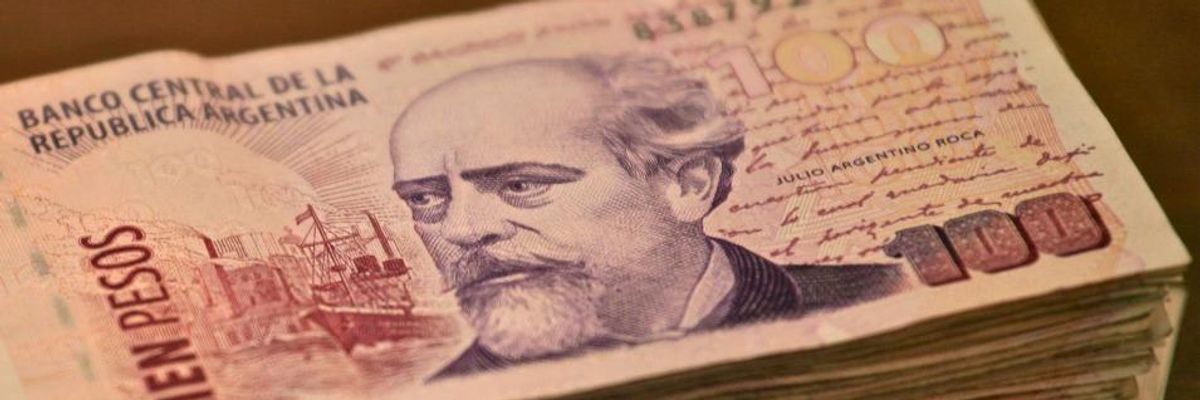
Argentine pesos (Photo: Alex Proimos/flickr/cc)
Argentina Accuses Judge of 'Harassment' in Ongoing Debt Fight
"This new attempt of judicial aggression against Argentina is an act of desperation on behalf of the vulture fund," said Argentine Foreign Minister Héctor Timerman.
Argentina charged U.S. District Judge Thomas Griesa with "excessive judicial harassment" on Monday after he found the sovereign nation in contempt of court for its refusal to follow his orders in a years-long battle over defaulted debt and overseas hedge funds.
Griesa previously ruled that the country, which went into default in 2001, could not pay off the 93 percent of its bondholders who had agreed to to lessen the country's debt burden, without first paying a group of U.S. "vulture fund" creditors that are seeking to profit from Argentina's debts by demanding the full value of its defaulted bonds.
"This new attempt of judicial aggression against Argentina is an act of desperation on behalf of the vulture fund," said Argentine Foreign Minister Hector Timerman. "They know that the impunity of their actions at the international level has its days numbered."
In a federal courthouse in Manhattan, Griesa said that Argentina "has been and is now taking steps in an attempt to evade critical parts of" the U.S. court order. "There's a very concrete proposal that would clearly violate the injunction."
Eric LeCompte, executive director of the religious financial reform organization Jubilee USA, said last Friday, "A contempt ruling probably won't help resolve the situation. The case continues to highlight how ineffective U.S. courts are at resolving debt disputes."
Griesa himself made a similar statement at a similar hearing in August, saying a contempt judgment "does not add to the scales of settlement." But Monday's finding comes after Argentina's attempt to avoid paying back the predatory New York hedge funds where Griesa's office is based.
Griesa also previously ruled that banks handling Argentina's bond payments, such as the country's trustee Bank of New York Mellon, could not pass its money along to other exchange bondholders without first paying the U.S. hedge funds. That decision led to Argentina's second default in 13 years in July after Griesa blocked Bank of New York Mellon from processing a $539 million payment from the country.
Griesa stopped short of issuing sanctions against Argentina on Monday, but warned that he was still considering using them. The vulture funds--including Aurelius Capital Management and NML Capital, which are part of the group of hedge funds led by billionaire Paul E. Singer--had previously asked Griesa to impose a daily fine of $50,000 against the country and order that it pay some of the companies' legal fees.
If Griesa decides to issue sanctions, however, his court will be limited in its power to enforce them on a sovereign nation.
Argentina said earlier on Monday that a contempt order would violate international law. In a letter to Secretary of State John Kerry, government officials wrote that Griesa's actions "excessive judicial harassment."
"A declaration of contempt would result in an unprecedented escalation in the conflict," the letter said.
"This predatory behavior hurts investors and countries of all sizes," LeCompte said on Friday. "The precedent in this case will hurt developing countries like Grenada and the Democratic Republic of the Congo."
Griesa's rulings have been highly criticized in Argentina by both the government and the citizens. In the capital of Buenos Aires, posters decorate the city depicting the judge's head on the body of a vulture. On Monday night, officials issued a statement criticizing Griesa for his most recent action.
"Griesa holds the sad record of being the first judge to declare a sovereign state in contempt of court for paying a debt, after failing in his attempt to obstruct Argentina's external debt restructuring," the government stated.
An Urgent Message From Our Co-Founder
Dear Common Dreams reader, The U.S. is on a fast track to authoritarianism like nothing I've ever seen. Meanwhile, corporate news outlets are utterly capitulating to Trump, twisting their coverage to avoid drawing his ire while lining up to stuff cash in his pockets. That's why I believe that Common Dreams is doing the best and most consequential reporting that we've ever done. Our small but mighty team is a progressive reporting powerhouse, covering the news every day that the corporate media never will. Our mission has always been simple: To inform. To inspire. And to ignite change for the common good. Now here's the key piece that I want all our readers to understand: None of this would be possible without your financial support. That's not just some fundraising cliche. It's the absolute and literal truth. We don't accept corporate advertising and never will. We don't have a paywall because we don't think people should be blocked from critical news based on their ability to pay. Everything we do is funded by the donations of readers like you. Will you donate now to help power the nonprofit, independent reporting of Common Dreams? Thank you for being a vital member of our community. Together, we can keep independent journalism alive when it’s needed most. - Craig Brown, Co-founder |
Argentina charged U.S. District Judge Thomas Griesa with "excessive judicial harassment" on Monday after he found the sovereign nation in contempt of court for its refusal to follow his orders in a years-long battle over defaulted debt and overseas hedge funds.
Griesa previously ruled that the country, which went into default in 2001, could not pay off the 93 percent of its bondholders who had agreed to to lessen the country's debt burden, without first paying a group of U.S. "vulture fund" creditors that are seeking to profit from Argentina's debts by demanding the full value of its defaulted bonds.
"This new attempt of judicial aggression against Argentina is an act of desperation on behalf of the vulture fund," said Argentine Foreign Minister Hector Timerman. "They know that the impunity of their actions at the international level has its days numbered."
In a federal courthouse in Manhattan, Griesa said that Argentina "has been and is now taking steps in an attempt to evade critical parts of" the U.S. court order. "There's a very concrete proposal that would clearly violate the injunction."
Eric LeCompte, executive director of the religious financial reform organization Jubilee USA, said last Friday, "A contempt ruling probably won't help resolve the situation. The case continues to highlight how ineffective U.S. courts are at resolving debt disputes."
Griesa himself made a similar statement at a similar hearing in August, saying a contempt judgment "does not add to the scales of settlement." But Monday's finding comes after Argentina's attempt to avoid paying back the predatory New York hedge funds where Griesa's office is based.
Griesa also previously ruled that banks handling Argentina's bond payments, such as the country's trustee Bank of New York Mellon, could not pass its money along to other exchange bondholders without first paying the U.S. hedge funds. That decision led to Argentina's second default in 13 years in July after Griesa blocked Bank of New York Mellon from processing a $539 million payment from the country.
Griesa stopped short of issuing sanctions against Argentina on Monday, but warned that he was still considering using them. The vulture funds--including Aurelius Capital Management and NML Capital, which are part of the group of hedge funds led by billionaire Paul E. Singer--had previously asked Griesa to impose a daily fine of $50,000 against the country and order that it pay some of the companies' legal fees.
If Griesa decides to issue sanctions, however, his court will be limited in its power to enforce them on a sovereign nation.
Argentina said earlier on Monday that a contempt order would violate international law. In a letter to Secretary of State John Kerry, government officials wrote that Griesa's actions "excessive judicial harassment."
"A declaration of contempt would result in an unprecedented escalation in the conflict," the letter said.
"This predatory behavior hurts investors and countries of all sizes," LeCompte said on Friday. "The precedent in this case will hurt developing countries like Grenada and the Democratic Republic of the Congo."
Griesa's rulings have been highly criticized in Argentina by both the government and the citizens. In the capital of Buenos Aires, posters decorate the city depicting the judge's head on the body of a vulture. On Monday night, officials issued a statement criticizing Griesa for his most recent action.
"Griesa holds the sad record of being the first judge to declare a sovereign state in contempt of court for paying a debt, after failing in his attempt to obstruct Argentina's external debt restructuring," the government stated.
Argentina charged U.S. District Judge Thomas Griesa with "excessive judicial harassment" on Monday after he found the sovereign nation in contempt of court for its refusal to follow his orders in a years-long battle over defaulted debt and overseas hedge funds.
Griesa previously ruled that the country, which went into default in 2001, could not pay off the 93 percent of its bondholders who had agreed to to lessen the country's debt burden, without first paying a group of U.S. "vulture fund" creditors that are seeking to profit from Argentina's debts by demanding the full value of its defaulted bonds.
"This new attempt of judicial aggression against Argentina is an act of desperation on behalf of the vulture fund," said Argentine Foreign Minister Hector Timerman. "They know that the impunity of their actions at the international level has its days numbered."
In a federal courthouse in Manhattan, Griesa said that Argentina "has been and is now taking steps in an attempt to evade critical parts of" the U.S. court order. "There's a very concrete proposal that would clearly violate the injunction."
Eric LeCompte, executive director of the religious financial reform organization Jubilee USA, said last Friday, "A contempt ruling probably won't help resolve the situation. The case continues to highlight how ineffective U.S. courts are at resolving debt disputes."
Griesa himself made a similar statement at a similar hearing in August, saying a contempt judgment "does not add to the scales of settlement." But Monday's finding comes after Argentina's attempt to avoid paying back the predatory New York hedge funds where Griesa's office is based.
Griesa also previously ruled that banks handling Argentina's bond payments, such as the country's trustee Bank of New York Mellon, could not pass its money along to other exchange bondholders without first paying the U.S. hedge funds. That decision led to Argentina's second default in 13 years in July after Griesa blocked Bank of New York Mellon from processing a $539 million payment from the country.
Griesa stopped short of issuing sanctions against Argentina on Monday, but warned that he was still considering using them. The vulture funds--including Aurelius Capital Management and NML Capital, which are part of the group of hedge funds led by billionaire Paul E. Singer--had previously asked Griesa to impose a daily fine of $50,000 against the country and order that it pay some of the companies' legal fees.
If Griesa decides to issue sanctions, however, his court will be limited in its power to enforce them on a sovereign nation.
Argentina said earlier on Monday that a contempt order would violate international law. In a letter to Secretary of State John Kerry, government officials wrote that Griesa's actions "excessive judicial harassment."
"A declaration of contempt would result in an unprecedented escalation in the conflict," the letter said.
"This predatory behavior hurts investors and countries of all sizes," LeCompte said on Friday. "The precedent in this case will hurt developing countries like Grenada and the Democratic Republic of the Congo."
Griesa's rulings have been highly criticized in Argentina by both the government and the citizens. In the capital of Buenos Aires, posters decorate the city depicting the judge's head on the body of a vulture. On Monday night, officials issued a statement criticizing Griesa for his most recent action.
"Griesa holds the sad record of being the first judge to declare a sovereign state in contempt of court for paying a debt, after failing in his attempt to obstruct Argentina's external debt restructuring," the government stated.

